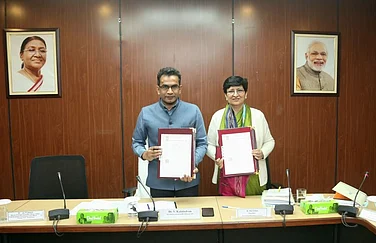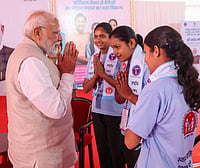The Government's decision to slash the Goods and Services Tax (GST) on beedis from 28 per cent to 18 per cent during the recent overhaul of the tax regime, while keeping other tobacco products in the highest 40 per cent slab, has not gone down well with health experts. They caution that this tax disparity threatens to make beedis more affordable and accessible, particularly among poor and vulnerable rural populations, potentially reversing gains made in tobacco control and escalating the nation’s already heavy tobacco-related disease burden.
Dr. Vishal Rao, recipient of the Judy Wilenfield Award for Global Tobacco Control by WHO Partners and well-known oncologist, termed the move “a subsidy to death” for economically disadvantaged communities. "Beedis, widely consumed by vulnerable populations, are very harmful. This tax disparity risks making beedis more affordable, potentially increasing their use, leading to cancers and other diseases."
Beedis, the most commonly smoked tobacco product in India, are used by over 70 million adults, according to the Global Adult Tobacco Survey (GATS) India 2016-17. According to doctors, beedis contain more tar and carbon monoxide than regular cigarettes. In fact, they contain three to five times more nicotine than traditional cigarettes, which means that there is an increased risk of nicotine addiction.
"The government's decision to lower the GST on beedis to 18 per cent while setting other tobacco products at 40 per cent is a detrimental step for public health... Uniformly high taxation across all tobacco products is critical to deter consumption and protect public health," said Dr. Rao, who is also a member of the Consultative Group to the Principal Scientific Advisor to the Prime Minister in India.
Dr. Vijay Kumar Aggarwal, Director and Head of Department (ICU, Pulmonology and Critical Care) at Yatharth Super Speciality Hospital, Faridabad, too described the move as a “bad decision.” He emphasised that it runs counter to the Government’s broader efforts to introduce household-friendly and healthcare reforms in the GST regime.
Beedi, a traditional form of tobacco consumption in India, is an unfiltered product widely used, especially in rural and low-income communities, Dr. Aggarwal said, pointing out that beedi smoking is more hazardous than other forms of tobacco due to the lack of filtration, leading to higher exposure to toxic substances. Highlighting the demographic most affected by this policy change, Dr. Aggarwal noted that nearly 30 per cent of women in villages are habitual beedi smokers. The consumers predominantly belong to economically disadvantaged strata and are particularly vulnerable to chronic obstructive pulmonary disease (COPD) and other serious lung ailments.
“Such health conditions not only pose significant medical challenges but also impose heavy financial burdens on these households, often exacerbating cycles of poverty,” he added.
Public health expert and Head of the Department of Rheumatology at AIIMS, Delhi, Dr. Uma Kumar, was equally vocal. She said evidence clearly shows that higher taxation helps prevent tobacco use by reducing its affordability. "Beedis are no less harmful than cigarettes or smokeless tobacco. Their toxicity is well documented and consumption leads to life-threatening diseases such as cancers, respiratory illnesses, and heart conditions," she said.
Dr. Pragya Shukla, Head of Clinical Oncology at Delhi State Cancer Institute, elaborated that beedis, widely used across India's rural and low-income communities, deliver dangerously high levels of tar, nicotine, and carbon monoxide, making them a significant driver of serious health issues such as oral and lung cancers, bladder cancers, cervical cancers, chronic respiratory diseases, and cardiovascular conditions.
“Higher and uniform taxation on all tobacco products, including beedis, is a proven public health strategy that reduces affordability, discourages uptake and lowers overall consumption. This approach helps protect vulnerable populations from devastating health consequences and reduces the immense economic burden on our healthcare system," she said.
The World Health Organisation (WHO) further recommends that at least 75 per cent of the retail price of tobacco products should be taxed to effectively reduce consumption. Tobacco-related diseases impose a massive economic toll, estimated at over Rs 1.77 lakh crore annually in India, driven by medical costs and productivity losses. Poor households bear the heaviest burden, and cheaper beedis could exacerbate this issue.
Health advocates are urging the government to reconsider the GST reduction, arguing that affordable access to a deadly product will derail tobacco control efforts, disproportionately affecting rural and low-income communities. They have emphasised that uniform taxation aligned with global recommendations is essential for achieving sustainable development goals related to health, poverty reduction, and social equity. Global studies show that a 10 per cent price increase can reduce tobacco consumption by 4-8 per cent in low- and middle-income countries, particularly among the youth and lower-income groups sensitive to price changes.



























